Max Care Virgin Coconut Oil (Cold Pressed)
₹ 664.00
| Taste | 10 |
|---|---|
| Aroma | 9.8 |
| Nutrients | 9 |
- Cold Pressed (Wood Pressed)
- Extra virgin coconut oil extracted from coconut milk
- Nutrient-rich
- Healthier alternative to refined oils
- Preservative-free
- Chemical-free
Cold Pressed vs. Refined Oils
In ancient times, oils were extracted using the Kachi Ghani (Cold Pressing) method, which involved crushing seeds at room temperature with a large wooden churner. In contrast, refined oils are produced by heating seeds to extremely high temperatures and incorporating chemicals. This excessive heat exposure degrades the oil’s quality, turning it into a potential health hazard. Over time, regular consumption of refined oils can lead to serious heart problems and other health concerns.
With increasing awareness of the harmful effects of refined oils, many people have shifted to cold-pressed oils in recent years. These oils, extracted through traditional mechanical pressing at low temperatures, retain more nutrients and natural flavor. Rich in vitamins, minerals, and antioxidants, cold-pressed oils offer a healthier alternative for everyday consumption.
Importance of Smoke Point in high heat cooking
Smoke point is also known as burning point of oil is a temperature at which oil breaks and releases harmful compounds that can cause potential health risks. When you see oil burning during cooking, you should immediately avoid using it.
Here is the list of oil smoke points of popular oils:
- Mustard Oil: 249°C
- Sesame Oil: 210°C to 232°C
- Safflower Oil: 246°C to 260°C
- Coconut Oil: 177°C
- Peanut Oil: 232°C
- Olive Oil: 163°C to 191°C
- Avocado Oil: 271°C
- Almond Oil: 221°C
Standard Home Cooking Temperatures:
- Pan frying (sauté) on stove top heat: 120°C
- Deep frying: 160–180°C
- Oven baking: Average of 180°C
You should select a oil which is both healthy and have highest smoke point. Also, avoid overheating any oil you use at home as it can become toxic and cause serious health issues.
Role of Saturated, Monounsaturated, and Polyunsaturated Fatty Acids
- Oil should contain ~5-12% of Saturated Fatty Acids (SFA). High intake of SFAs is linked to an increased risk of cardiovascular diseases such as chest pain, heart attacks, and strokes.
- High amount of Monounsaturated Fatty Acids makes the oil stable at higher temperatures (high heat cooking). They improve heart health by lowering bad cholesterol (LDL) while maintaining good cholesterol (HDL). Oils should contain ~60-70% of Monounsaturated Fatty Acids (MUFA).
- Polyunsaturated Fatty Acids (PUFA) are essential for the body and provide Omega-3 and Omega-6 fatty acids required for brain and other organ development. However, excessive PUFA intake can lead to oxidative stress and inflammation, especially if Omega-6 is too high compared to Omega-3. Oil should contain moderate (~20-30%) amount of Polyunsaturated Fatty Acids.
Regular vs. Virgin Coconut Oil
Regular coconut oil is made from sun-dried, roasted copra (dried coconut kernels) using cold-pressing (kacchi ghani) method. On the other hand, virgin coconut oil is typically extracted from fresh coconut meat without drying, preserving its natural nutrients and flavor. Both regular and virgin coconut oils are far better than refined coconut oil.
Adverse effects of high saturated fatty acids within coconut oil
Coconut oil is rich in saturated fatty acids (~85-90%), but not all saturated fats are the same. Medium-chain triglycerides (MCTs) in coconut oil are easily digested and quickly converted into energy, supporting metabolism and brain function. Use coconut oil in moderation—once or twice a week. It helps in maintaining good cholesterol levels, supports heart health when balanced with other healthy fats, and enhances nutrient absorption. It also has lauric acid in good quantity which helps fight bacteria, fungi and viruses and improves immunity.
Refined oils are dangerous and can cause serious health issues such as chest pain and heart attack. With growing awareness, people are searching for healthy oils in the market. You may notice that the entire internet is raving about Olive oils but they are super costly as they need to be imported from other countries. Traditional Indian cooking oils made from mustard seeds, coconut meat, sesame seeds, and peanut has almost similar nutritional profile compared to Olive oil if obtained by cold pressing.
Indians used to extract oil by crushing seeds or any other material using a wooden churner. Such method was known as Kachi Ghani (Cold Pressing in English).
Please watch the following video,
Max Care Virgin Coconut Oil (Cold Pressed)
Max Care’s coconut oil is our top choice because,
- It is cold pressed at room temperature
- It is extracted from high-quality, fresh coconut milk
- The oil can be used for internal consumption & external application such as skin care, hair care, and baby care
Alternatives
- Cold Pressed (Wood Pressed)
- Nutrient-rich
- 100% natural and free from preservatives and chemicals
- Extracted from fresh or dried coconut meat
KLF Coconad Edible Coconut Cooking Oil
KLF Coconad Edible Coconut Cooking Oil
This oil by KLF is extracted from dried coconut kernels (copra). This method produces 100% pure coconut oil with a sweet aroma of roasted copra, ideal for cooking Kerala or coastal cuisines. It is one of the highly-rated and best budget-friendly coconut oil brand in the market.
Why it is not our top pick?
- It is not a virgin coconut oil (extracted from fresh coconut meat)
- Oil is extracted using Vacumised Steam Injection Cooking (VSIC) method and not cold-pressing method
Tata Simply Better Pure and Unrefined Cold Pressed Virgin Coconut Oil
Tata Simply Better Cold Pressed Virgin Coconut Oil
If you are looking for a 100% pure oil derived from fresh coconut meat using cold-pressing method, this one is for you. It boosts energy with 60% MCTs and is a healthy alternative to refined oils. In contrast to our top pick from Max Care coconut oil which is extracted from coconut milk, this one by Tata Simply Better is extracted from fresh coconut meat. It is as healthy and nutritious as oil derived from coconut milk.
Why it is not our top pick?
- This is not extra virgin coconut oil extracted from coconut milk
Anveshan Wood Pressed Coconut Oil
Anveshan Wood Pressed Coconut Oil
This coconut oil from Anveshan is extracted from sun-dried coconut kernels. It is the most common (standard) method of extracting coconut oil in India. The oil is extracted using cold-pressing (kacchi ghani) method.
Why it is not our top pick?
- This is a regular coconut oil derived from dried copra (sun-dried coconut kernels)
Closing Notes
Customers should not rely on only one oil type for their day-to-day needs as each oil has a different nutritional profile.
For example,
- Mustard oil is high in oleic acid which is good for heart health
- Lauric acid in coconut oil boosts immunity
- Sesamin and sesamol in sesame oil has excellent antioxidant properties
It is suggested by the doctors and experts that you should use 3-4 types of cold-pressed oils. You can use them alternate days.
Specification: Max Care Virgin Coconut Oil (Cold Pressed)
| Mustard Oil | ||||||||||
|---|---|---|---|---|---|---|---|---|---|---|
|
||||||||||
| Coconut Oil | ||||||||||
|
||||||||||
| Dimensions | ||||||||||
|
||||||||||

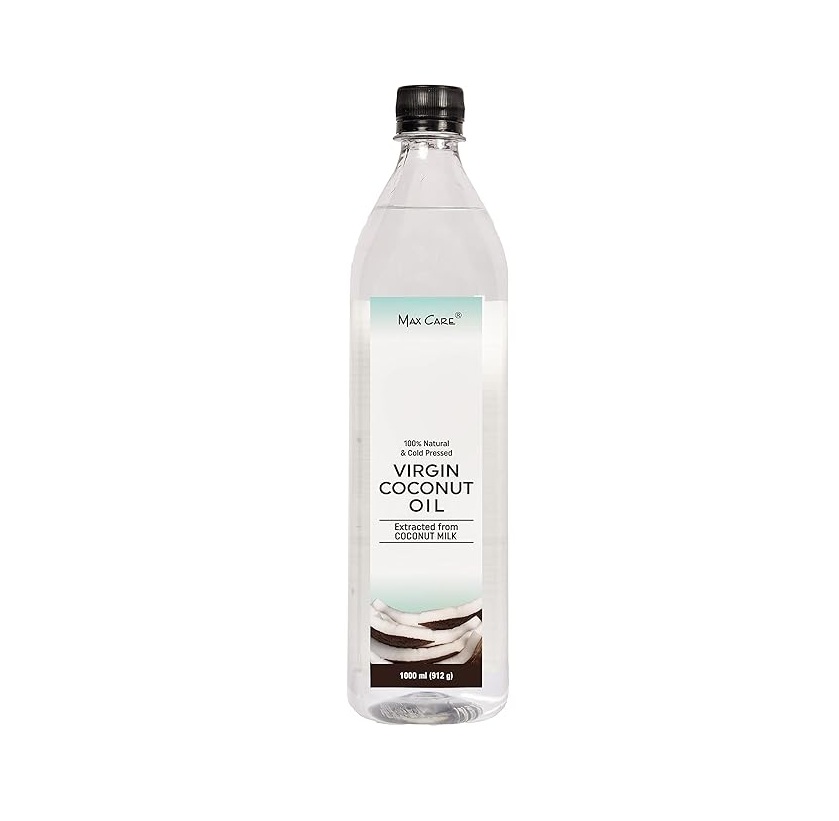

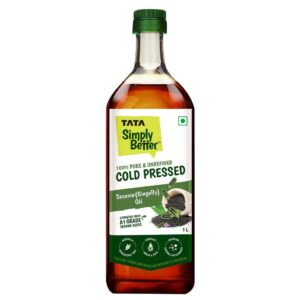
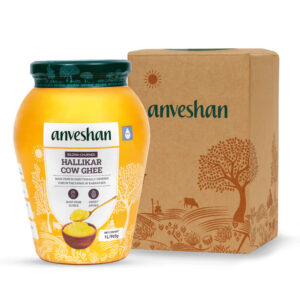

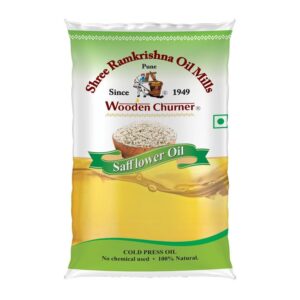
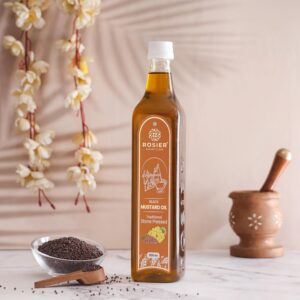
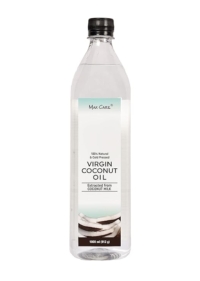
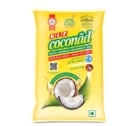
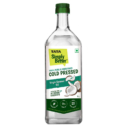
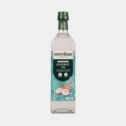

There are no reviews yet.